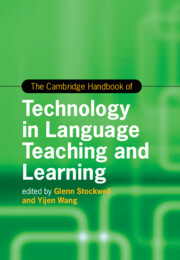Book contents
- The Cambridge Handbook of Technology in Language Teaching and Learning
- Cambridge Handbooks in Language and Linguistics
- The Cambridge Handbook of Technology in Language Teaching and Learning
- Copyright page
- Contents
- Figures
- Tables
- Contributors
- Abbreviations
- Part I Laying the Foundations
- Part II Environments
- Part III Tools
- Part IV Social Aspects
- Part V Practice
- 18 Learner Training
- 19 Digital Media and Interculturality
- 20 Literacies for Teaching
- 21 Overcoming Teacher Resistance
- 22 Online Communities for Teachers
- 23 Task-Based Language Teaching
- Part VI Language Skills and Areas
- Glossary
- Index
- References
22 - Online Communities for Teachers
from Part V - Practice
Published online by Cambridge University Press: 15 June 2025
- The Cambridge Handbook of Technology in Language Teaching and Learning
- Cambridge Handbooks in Language and Linguistics
- The Cambridge Handbook of Technology in Language Teaching and Learning
- Copyright page
- Contents
- Figures
- Tables
- Contributors
- Abbreviations
- Part I Laying the Foundations
- Part II Environments
- Part III Tools
- Part IV Social Aspects
- Part V Practice
- 18 Learner Training
- 19 Digital Media and Interculturality
- 20 Literacies for Teaching
- 21 Overcoming Teacher Resistance
- 22 Online Communities for Teachers
- 23 Task-Based Language Teaching
- Part VI Language Skills and Areas
- Glossary
- Index
- References
Summary
Teachers need to continually keep up with the ever-evolving language teaching and learning landscape brought by advancements in technology throughout their long careers. However, in actuality, they often receive little or no support from their institutions, which, consequently, leave them no choice but to learn on their own. In light of the current situation, it is not entirely unexpected that some teachers have been reaching out to online teacher communities formed on various social media platforms, including X and Facebook, which are easily accessible to virtually anyone as long as they have access to the internet, regardless of their location, work schedule, or financial situation. Hence, the present chapter aims to shed light into how these online teacher communities can be used as a professional learning source for teachers, particularly for those who are using technology for teaching purposes. It begins by giving a brief historical overview of online teacher communities, and drawing on well-cited studies predominantly conducted since the early 2010s. The benefits and challenges of teachers’ use of online teacher communities are then explored. The chapter ends with an outline of future research directions and predictions of what the future holds for online teacher communities.
Keywords
Information
- Type
- Chapter
- Information
- Publisher: Cambridge University PressPrint publication year: 2025
References
References
Further Reading
Drawing on data collected from forty-eight teachers via semistructured interviews and focus groups, this study examines the potential pitfalls in teachers’ professional use of social media. In alignment with a social–ecological model, the four main types of identified challenges are presented in detail.
In this book chapter, the author outlines the key issues associated with the current state of CALL teacher education and offers practical advice on how language teachers can capitalize upon online tools and resources, including online teacher communities, to potentially enhance their professional knowledge and skills in CALL.
This article discusses critical features of successful online communities for world language teachers based on empirical studies related to computer-mediated communication in language teacher training contexts. Touching on teaching-related issues triggered by the ongoing COVID-19 pandemic, the possibilities of online teacher communities are explored.
